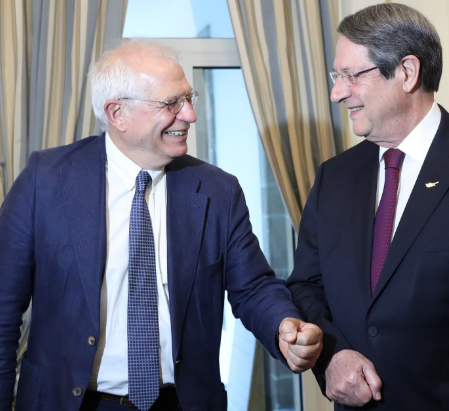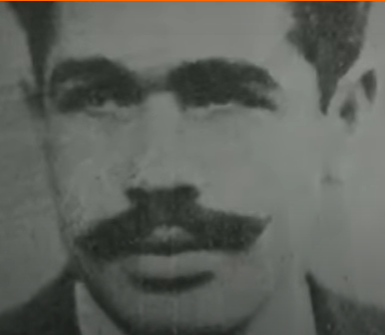

by John Helmer, Moscow
@bears_with
Nothing like this has been said before by a leader of the Hellenes, Greek or Cypriot.
“If we consider a solution through militarisation,” Cyprus President Nicos Anastasiades (lead image, right) announced last week. “This will be the end of Cypriot Hellenism, which I do not want.” What Anastasiades meant was that he does not want Cyprus to defend itself, its land, airspace, territorial waters, and sea lanes, by military means.
A Cypriot president who swears off military defence “of the independence and territorial integrity of the Republic of Cyprus” is violating his oath of office; he is betraying the Cyprus Constitution. A veteran of Cypriot presidential politics comments that Anastasiades is making the calculation that his best chance for winning a third term of office is submission to Turkey first, and submission to the US, the European Union, and Israel to limit Turkish military expansion in and around the island.
This is a strategy of buying time for himself, the source said, and riches for his associates. “He will be very happy to see Cyprus as a satrapy of Turkey provided he and his associates become the sultan’s satraps.”

Anastasiades gave Ankara his no-defence pledge after meeting the European Union’s (EU) foreign minister Josep Borrell (right) in Nicosia last Thursday evening. Anastasiades claimed he had briefed Borrell on “Turkey’s illegal activities in Cyprus’ maritime zones and impact on regional stability”. He also claimed that in return he got an “expression of #EU solidarity in a concrete manner.” Just how concrete this was Borrell tweeted in reply: “EU stands with Cyprus supports its sovereign rights, striving for honest and comprehensive regional dialogue and for improving neighbourly relations.”
After he had seen Borrell to his palace door, Anastasiades claimed that instead of self-defence for Cyprus, he aims to use “weapons of diplomacy”. The principal ones are his agreement with the US to refuse to support Russia’s defence of Syrian sovereignty against Turkish attacks; and his promise to the Europeans to limit his challenge to the Turkish air and naval supply lines into Libya to papers filed in New York and Brussels.
Turkey’s moves into the eastern Mediterranean are part of the largest military expansion the country has attempted for several hundred years, as Turkish analysts explain. “At the moment,” writes İlhan Uzgel, “Turkey is simultaneously engaged in three (and a half) military operations in three countries, a rare feat for any country in the world, let alone in Turkish history.” In the naval part of this strategy, nicknamed Mavi Vatan, “Blue Homeland”, Cyprus is treated as one of the least of the obstacles: a third of the island is already occupied and operated as a Turkish military base, and the surrounding territorial waters are being occupied by a combination of Turkish drilling-vessels, naval escorts and air force overflights, against which the US and EU have provided token resistance. Anastasiades’s new statement promises even less.
For a review of Russian, European and Greek resistance to Mavi Vatan, read this. According to Marios Evriviades , a former Cypriot diplomat and now professor of international relations in Cyprus and Greece, “especially on the issue of sea borders and the EEZ [Exclusive Economic Zone] , Athens has been chasing its tail for decades in the belief that Turkish aggression will magically evaporate.” Greek and Cypriot policy, according to Evriviades, should be to defend, and call the Turkish bluff.
Cypriot officials also point out that a special tax levied on dividends and interest – titled the Special Contribution for Defence — is supposed to be paid into a state defence fund and spent on military preparedness. In fact, the money ends up in the general-purpose state budget. That Cypriot analysts, officials and military officers aren’t lacking in the will and the capability to devise options to defend against Turkey is reported here.
Last week Anastasiades downgraded the defence ministry even more by appointing a municipal official, Aglandjia Mayor Charalambos Petrides, as the new minister. He was the president’s third choice after two others refused to accept the post.
Anastasiades is defenceless by choice, a Russian observer in Limassol comments. “In the absence of any defence treaties, NATO membership, EU army or God forbid! Russian protection, he just threw Cyprus to [Turkish President Recep Tayyip] Erdogan. What bargaining chip does he have left?”
The Russian assessment of Anastasiades is that the only Russian interest he consistently serves is corrupt, and that he is a soft touch for US pressure to cut the island’s political and financial ties with Moscow. The sources point to Anastasiades’s long association with Leonid Lebedev, a runaway Russian senator who took Cypriot citizenship, then US residence, to hide the proceeds of his financial dealings. Lebedev was condemned as a liar and fraudster in a New York court recently.
A year ago, the Russian Foreign Ministry condemned Anastasiades’s attempt to apply EU sanctions as one of his “diplomatic weapons”. “Sanctions should not be used as a tool for exerting pressure,” said Foreign Ministry spokesman Maria Zakharova on July 17, “although unfortunately this has become an important factor in international relations today. This is by no means a diplomatic tool and should not be at the core of international politics. Sanctions lead to dire consequences: the erosion of international law and civilised forms of communication.”
More recently, on March 25, the Kremlin announced it is canceling tax preferences for the transfer of Russian dividends and interest to offshore havens, starting with Cyprus. Anastasiades’ appeals ran into a stonewall. A last-minute telephone call on June 17 to Russian Foreign Minister Sergei Lavrov failed. Two days later, the Moscow business papers reported “Russia intends to break the current agreement with Cyprus on the avoidance of double taxation… the authorities of the island state did not submit their proposals for changing rates to Moscow.” Cypriot ministers, adds the Russian source in Limassol, “ would rather go to sleep dreaming of the future the US is promising than wake up to smell the coffee. There have been three months for the negotiation over the tax agreement. There is no outcome except to show how Cyprus has jumped off a cliff.”
Cypriot and Greek historians say they cannot remember a no-defence policy like Anastasiades’ announcement of last week. The reason for it, they explain, is his calculation that for the next two years the president should avoid conflict with the Turks at all costs. This, the sources say, is his re-election calculation. The presidential election due at the beginning of 2023 is the last which can be held before an amendment of the Cyprus Constitution, introduced last December, takes effect. This limits an incumbent to two consecutive five-year terms; first elected in 2013, then re-elected in 2018, Anastasiades can therefore hope for a third term.

As for refusing to defend, most Cypriots remember the most famous saying in Greek history is the answer of the Spartans, on the eve of the Battle of Thermopylae in 480 BC, to the Persian demand to surrender their arms.
ΜΟΛΩΝ ΛΑΒΕ — was the Greek reply. “Come and take them.” This has special meaning in Cyprus because they were the last words of Grigoris Afxentiou (right) on March 3, 1957. Afxentiou, one of the leaders of the Cypriot war of independence against British occupation, had been betrayed by an informant and his cave hideout surrounded by British troops. Called on to surrender Afxentiou replied ΜΟΛΩΝ ΛΑΒΕ . The British then poured petrol into the cave and set it on fire. Afxentiou was burned alive. This is his story.











Leave a Reply